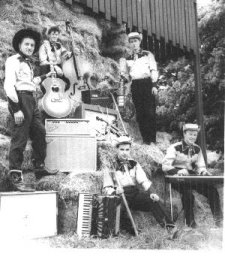 With
the progression of the Second World War, hoards of US GIs
came to be stationed in the UK and with them Country Music
slowly made its way over to this side of the "Great Pond"
during the 1940s. Known as Country & Western at that time,
I understand that "Western" actually meant
Western Swing and not cowboy songs as most people reason.
As part of the entertainment for the troops, major touring
artistes performed as part of the USO shows, either in Britain,
or on the European mainland, bringing respite during the war.
Several Country singers performed in these shows, with many
British troops finding themselves being exposed to this new
style of indigenous American With
the progression of the Second World War, hoards of US GIs
came to be stationed in the UK and with them Country Music
slowly made its way over to this side of the "Great Pond"
during the 1940s. Known as Country & Western at that time,
I understand that "Western" actually meant
Western Swing and not cowboy songs as most people reason.
As part of the entertainment for the troops, major touring
artistes performed as part of the USO shows, either in Britain,
or on the European mainland, bringing respite during the war.
Several Country singers performed in these shows, with many
British troops finding themselves being exposed to this new
style of indigenous American 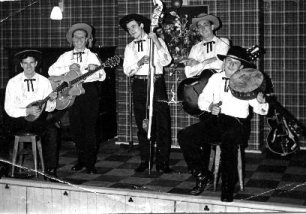 music
and finding it very appealing. After the conflict was over,
many US troops were garrisoned at several American bases around
Britain. These pioneer years saw American Forces Network Radio
being broadcast, with programs such as The Grand Ole Opry,
giving the US troops a taste of back home. Many Brit's
found the AFN broadcasts on their dials, tuning in especially
to listen to this new and invigorating style of music. The
growth of Country Music had begun in the UK! music
and finding it very appealing. After the conflict was over,
many US troops were garrisoned at several American bases around
Britain. These pioneer years saw American Forces Network Radio
being broadcast, with programs such as The Grand Ole Opry,
giving the US troops a taste of back home. Many Brit's
found the AFN broadcasts on their dials, tuning in especially
to listen to this new and invigorating style of music. The
growth of Country Music had begun in the UK!
During the 50s, merchant seamen returning home from
their voyages to the US brought a wealth of Country Music
records back with them, exposing more people to this type
of music. Dockland areas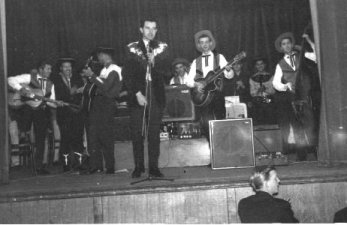 such as Liverpool would see musicians leaning towards Country
when performing around the pub and club scene. Soon
Country music found its way onto the folk club scene, with
artistes performing numbers from the likes of Jimmy Rogers
and the Carter Family. Black Cat Club (1950s-60s) was the
first club playing Country Music in Liverpool and in Manchester,
the first was the York Club (1956-60), with the MSG (Manchester
Sports Guild) following on in 1960. The same thing was probably
happening all over Britain, as Country & Western music
took hold and clubs started opening up exclusively for Country
Music.
such as Liverpool would see musicians leaning towards Country
when performing around the pub and club scene. Soon
Country music found its way onto the folk club scene, with
artistes performing numbers from the likes of Jimmy Rogers
and the Carter Family. Black Cat Club (1950s-60s) was the
first club playing Country Music in Liverpool and in Manchester,
the first was the York Club (1956-60), with the MSG (Manchester
Sports Guild) following on in 1960. The same thing was probably
happening all over Britain, as Country & Western music
took hold and clubs started opening up exclusively for Country
Music.
British artistes starting to establish themselves in
the 50s - 60s were names such as Frank Yonko & the Texas
Drifters (later the Everglades), Slim Traynor & the
Hillbilly Bandits, Country Cousins (Ian McDowall now lives
in Australia and Doug Darby in 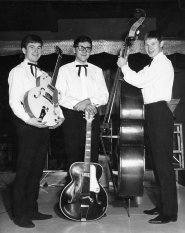 the
USA) and Pete Elliott - Hobos, all came from Manchester.
Liverpool produced such famous bands as, The Blue Mountain
Boys, Hank Walters & his Dusty Road Ramblers (presently
Hank Walters & the Arcadian Lady's), Phil Brady &
the Ranchers, The Sundowners and the Hillsiders, who finally
disbanded a few of years ago. the
USA) and Pete Elliott - Hobos, all came from Manchester.
Liverpool produced such famous bands as, The Blue Mountain
Boys, Hank Walters & his Dusty Road Ramblers (presently
Hank Walters & the Arcadian Lady's), Phil Brady &
the Ranchers, The Sundowners and the Hillsiders, who finally
disbanded a few of years ago.
Jan Holly now lives in the States, but back in the 60's
she sang with the band Jan and The Sutherners who worked
with Miki & Griff and also The Hillsiders on the 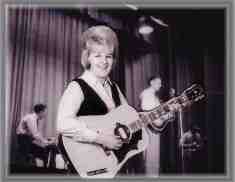 George
Hamilton IV show. Jan recollects; "I started
out singing country in a coffee bar in London's Tottenham
Court Road and it became a real hangout and meeting place
for lovers of C&W. Among others, Dave Peacock (of Chas
& Dave) would come and sit in with me after a gig. One
time Bill Haley was in town (playing out at the bases) and
the whole band came in and ended up taking me back to their
hotel to meet Bill and we had a two-hour Jam session." George
Hamilton IV show. Jan recollects; "I started
out singing country in a coffee bar in London's Tottenham
Court Road and it became a real hangout and meeting place
for lovers of C&W. Among others, Dave Peacock (of Chas
& Dave) would come and sit in with me after a gig. One
time Bill Haley was in town (playing out at the bases) and
the whole band came in and ended up taking me back to their
hotel to meet Bill and we had a two-hour Jam session."
One of Britain's biggest names in Country music was
Miki & Griff, who met when they both became members
of the George Mitchell Choir and were married in 1950. Leaving
Mitchell, they developed their own act including comedy
and novelty songs. In 1958 they fell in love with the Everly
Brother's Country album, "Songs Our Daddy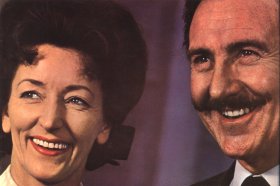 Taught Us" and various Louvin Brothers albums. Lonnie
Donegan heard Miki & Griff singing these songs in their
dressing-room and invited them on to his TV show to sing
them and also had a hand in producing their Country records.
Soon they gained the nickname of "Britain's Mr &
Mrs Country Music". In 1958 Miki & Griff made the
UK Top 30 with 'Hold Back Tomorrow' and recorded successful
EPs with 'Rockin' Alone (In An Old Rockin' Chair)' and 'This
Is Miki - This Is Griff'. In 1962 they had a UK Top 20 hit
with Burl Ives' 'A Little Bitty Tear' and in 1964 received
a standing ovation at the Grand Ole Opry, when they appeared
in Roy Acuff's part of the show. Sadly Miki passed away
with cancer in April 1989 and Griff died just a year or
two ago.
Taught Us" and various Louvin Brothers albums. Lonnie
Donegan heard Miki & Griff singing these songs in their
dressing-room and invited them on to his TV show to sing
them and also had a hand in producing their Country records.
Soon they gained the nickname of "Britain's Mr &
Mrs Country Music". In 1958 Miki & Griff made the
UK Top 30 with 'Hold Back Tomorrow' and recorded successful
EPs with 'Rockin' Alone (In An Old Rockin' Chair)' and 'This
Is Miki - This Is Griff'. In 1962 they had a UK Top 20 hit
with Burl Ives' 'A Little Bitty Tear' and in 1964 received
a standing ovation at the Grand Ole Opry, when they appeared
in Roy Acuff's part of the show. Sadly Miki passed away
with cancer in April 1989 and Griff died just a year or
two ago.
Liverpool band Kenny Johnson and Northwind
decided to disband at the end of 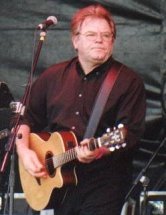 2002,
but up to that date they were one of the top outfits on
the British Country scene. Kenny was a promising soccer
player with the Liverpool school boys, but found that music
took over and started in the music business as a semi-pro
over 40 years ago, playing Skiffle, Country and Rock 'n'
Roll. 1958 saw Kenny Johnson forming Sonny Web and the Country
Two, which then became the Country Four and then Sony Web
and the Cascades in 1961 (a name he has used until this
date for his Rock 'n' Roll shows), with Joe Butler on bass
and Frank Wan on lead guitarist. In 1964 Kenny formed the
Hillsiders, who were recognised as one of Britain's top
Country bands for over 3 decades, playing major venues and
touring the GI bases both at home and in Germany. They opened
for many of Country Music's major artistes such as Marty
Robbins, Jerry Lee Lewis, Gene Watson and Glen Campbell.
Not only did the Hillsiders tour with Bobby Bare; they also
recorded an album "The English Countryside" with
him on the RCA Nashville label, produced by the renowned
Chet Atkins. "The English Countryside" made #17
on the US Billboard Country Charts and received a silver
disk for sales. 2002,
but up to that date they were one of the top outfits on
the British Country scene. Kenny was a promising soccer
player with the Liverpool school boys, but found that music
took over and started in the music business as a semi-pro
over 40 years ago, playing Skiffle, Country and Rock 'n'
Roll. 1958 saw Kenny Johnson forming Sonny Web and the Country
Two, which then became the Country Four and then Sony Web
and the Cascades in 1961 (a name he has used until this
date for his Rock 'n' Roll shows), with Joe Butler on bass
and Frank Wan on lead guitarist. In 1964 Kenny formed the
Hillsiders, who were recognised as one of Britain's top
Country bands for over 3 decades, playing major venues and
touring the GI bases both at home and in Germany. They opened
for many of Country Music's major artistes such as Marty
Robbins, Jerry Lee Lewis, Gene Watson and Glen Campbell.
Not only did the Hillsiders tour with Bobby Bare; they also
recorded an album "The English Countryside" with
him on the RCA Nashville label, produced by the renowned
Chet Atkins. "The English Countryside" made #17
on the US Billboard Country Charts and received a silver
disk for sales. 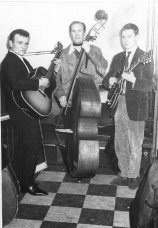 Another
major Country artiste that the Hillsiders recorded with
was George Hamilton IV. Another
major Country artiste that the Hillsiders recorded with
was George Hamilton IV.
Due to their great popularity the Hillsiders were invited
on to the Grand Ole Opry in 1967, when it was held at the
famous Ryman Auditorium and Kenny still has the program
that includes the bands name. Johnson is proud to say that
the Hillsiders are probably the only British band to be
invited to play on the hallowed stage of the Ryman, where
such great names has Hank Williams has stood before. Kenny
left the band in 1974-75, forming his current band Northwind,
which has had several changes in the line-up over the years.
Both Kenny Johnson and the Hillsiders have written and recorded
a large number of songs and have won numerous major Country
Music awards. Kenny now has a regular Country program on
BBC Merseyside radio every Saturday.
The mid 60s Country saw the growth of British Country
artistes, such as fiddle player Brian Golby, who joined
Pete Stanley to form the highly acclaimed duo. Brian gained
the admiration of many American artistes and has worked
with Patsy Montana, Mac 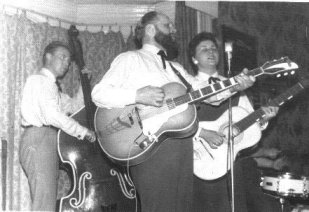 Wiseman
and appeared on Ernest Tubb's "Midnight Jamboree"
and Nashville's WSM Early Morning Show. He was awarded CMA
(GB) Male Vocalist of The Year in 1971. Brian Chalker was
brought up on Country Music from an early age and started
out as a solo artiste in the late 60s. In 1970 he formed
the Frontier Band, starting as an acoustic 3 piece and expanding
to an electric 5 piece, and would go on stage with 15 different
instruments. Brian's first album was the "The Hanging
Of Samuel Hall" on the Avenue label, which sold very
well through the 'supermarkets'. He had several minor hits
in Europe with 'Help Me Make It Through the Night', 'Me
and Bobby McGee' and 'The Eskimo Song'. Brian has received
seven awards including two from the US Billboard Magazine
and won Top British Country Vocalist award in 1973. He has
been a policeman and a detective with the famous Pinkerton's
in Canada and more recently Brian has worked as a radio
presenter on satellite radio with CMR and is at present
with Merlin Wiseman
and appeared on Ernest Tubb's "Midnight Jamboree"
and Nashville's WSM Early Morning Show. He was awarded CMA
(GB) Male Vocalist of The Year in 1971. Brian Chalker was
brought up on Country Music from an early age and started
out as a solo artiste in the late 60s. In 1970 he formed
the Frontier Band, starting as an acoustic 3 piece and expanding
to an electric 5 piece, and would go on stage with 15 different
instruments. Brian's first album was the "The Hanging
Of Samuel Hall" on the Avenue label, which sold very
well through the 'supermarkets'. He had several minor hits
in Europe with 'Help Me Make It Through the Night', 'Me
and Bobby McGee' and 'The Eskimo Song'. Brian has received
seven awards including two from the US Billboard Magazine
and won Top British Country Vocalist award in 1973. He has
been a policeman and a detective with the famous Pinkerton's
in Canada and more recently Brian has worked as a radio
presenter on satellite radio with CMR and is at present
with Merlin 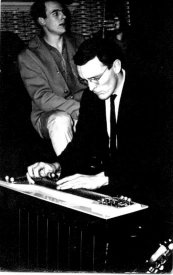 Radio.
He has released three special compilation albums of his
music on the CMR label, which are available by mail order
and are selling very well. Radio.
He has released three special compilation albums of his
music on the CMR label, which are available by mail order
and are selling very well.
In 1968, promoter Mervyn Conn took a great gamble to
start the first International Country Music Festival, which
was later to be commonly known as The Wembley Festival.
Practically every International and British Country artiste
of the day played Wembley, which was always held over the
Easter period. This was the premier event of the British
Country Music calendar and those fans that were not able
to go to Wembley, waited in anticipation for the BBC TV
to broadcast edited highlights.
As Country Music moved into the 70s and 80s several
Country music clubs were opening up and several Country
festivals came into existence around Britain. Festivals
such as Peterborough and Morecambe ran for several years
and included many popular international artistes, but unfortunately
these festivals ended some years ago. Cambridge Folk Festival,
which started in 1964, has included several Country Artistes
in their line-up, such as Kathy Mattea and singer/songwriter
Towns Van Zandt. 1999 saw the inclusion of Suzy Bogguss,
Hal Ketchum and Stacey Earle (Steve's sister) over the festival
weekend.
Some of the major British Country music festivals of
today include the Great North C&W Festival at Witton
Castle Co Durham, Hemsby, Scapcote, Yorkshire Dales C&W
Festival and the North Wales Country Music Festival. The
North Wales festival, which is held in March, includes several
international artistes and always opens with a full night
of Country 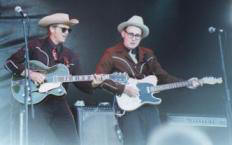 Music
sang in the Welsh language on the Thursday. The biggest
event of the British Country Calendar has to be Notts, Americana
International Festival, which is held at Newark Showgrounds
in July. Americana started over 20 years ago as a show for
American car enthusiasts. Now it includes everything connected
with Americana, with several stages playing Country Music
and Rock 'n' Roll, including both British & International
artistes on stage. The Bellamy Brothers drew a massive crowd
for 1999 and came back in 2001. Over the years George Hamilton
IV has seen Hells Angels rubbing shoulders with Rock 'n'
Rollers and Country fans of all ages, for his morning Country
Gospel Show. In 2002 George Hamilton IV was unable to perform
and singer songwriter Paul Overstreet presented the gospel
show on the Sunday along with his country performance on
the Saturday. Also on the bill in 2002 was BR549 and rockabilly
singers Nick Willett and Janis Martin from the USA along
with Britain's king of skiffle Lonnie Donegan who was the
closing at for the festival on the Sunday. Music
sang in the Welsh language on the Thursday. The biggest
event of the British Country Calendar has to be Notts, Americana
International Festival, which is held at Newark Showgrounds
in July. Americana started over 20 years ago as a show for
American car enthusiasts. Now it includes everything connected
with Americana, with several stages playing Country Music
and Rock 'n' Roll, including both British & International
artistes on stage. The Bellamy Brothers drew a massive crowd
for 1999 and came back in 2001. Over the years George Hamilton
IV has seen Hells Angels rubbing shoulders with Rock 'n'
Rollers and Country fans of all ages, for his morning Country
Gospel Show. In 2002 George Hamilton IV was unable to perform
and singer songwriter Paul Overstreet presented the gospel
show on the Sunday along with his country performance on
the Saturday. Also on the bill in 2002 was BR549 and rockabilly
singers Nick Willett and Janis Martin from the USA along
with Britain's king of skiffle Lonnie Donegan who was the
closing at for the festival on the Sunday.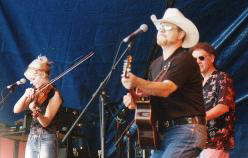
During the 90s several small promoters have been staging
shows with many of the lesser-known touring artistes, such
as singer/songwriters who are perhaps seen to be more on
the fringe of Country Music. Artistes such as Chip Taylor,
Kate Jacobs, Tom Pacheco, are gaining a foothold on the
British scene, alongside the more popular Country songwriters
such as Ray Wylie Hubbard, Tom Russell and Alison Moorer
who came to prominence with 'A Soft Place To Fall' from
Robert Redford's movie, The Horse 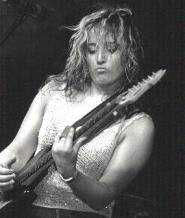 Whisperer. Whisperer.
Of the top British artistes who are making bigger inroads
with their music, we have seen Sarah Jory, and songwriters
such as Charlie Landsborough and Raymond Froggatt, playing
theatre shows. Charlie's was a Merseyside schoolteacher
who wrote a number of songs for Foster & Allen and performing
as a semi-pro on the local club and festival scene for many
years. When his own recording of his song 'What Colour Is
The Wind' was a smash hit and made #1 on the Irish charts,
he turned fully professional and now plays to sell-out audiences.
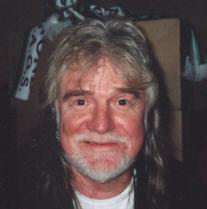
Raymond Froggatt is a major British songwriter, who
has become a kind of cult figure on the British Country
scene. His songwriting is so profound that I've seen many
strapping men brush the odd tear from their eye. As far
back as the 60s Froggatt was writing hits such as 'Red Balloon'
#7 for Dave Clark Five in 1968 and 'Big Ship' #8 in 69,
for Cliff Richards. Promoter Mervyn Conn encouraged Froggatt
to switch to Country and cut his first Country album "Southern
Fried Frog" in Nashville during 1978 with top producer
Larry Butler. Raymond Froggatt is one of very few musicians
to be granted the Freedom of the City of Birmingham, his
hometown.
The British club scene has seen great changes over the
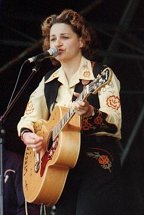 past few years; many well established clubs having to close
because of a lack of support from Country fans. At present
I only know of three listening clubs in the North West area,
still striving to offer good Country Music on a regular
weekly bases, which is a sad state of affairs. Many of today's
bands seem to have followed the Line Dance scene, which
exploded out of all proportion 3-4 years ago. I personally
feel that many of the bands are coming back to traditional
Country music and hopefully the wheel is turning once again.
Young bands are coming onto the scene, writing and playing
their own material in true traditional style. Though the
Nashville pop-orientated drivel is being forced on us in
the name of Country Music, traditional bands such as BR549
show us what Country Music really is. Britain's Rimshots
and Rusti Steel & The Tin Tax received the British Country
Music Award for their tribute album to Hank Williams in
March 1999. Another highly praised band is Lynette Morgan
& Her Tennessee Rhythm Riders, who had a successful
tour of the USA in September 99, playing Hillbilly and Western
Swing music in the 40s style of The Maddox Brothers &
Rose. After two of the members left the band the name was
changed to Lynette Morgan and The Blackwater valley Boys.
Hopefully young bands such as these will keep Traditional
Country Music alive for future generations of British fans.
past few years; many well established clubs having to close
because of a lack of support from Country fans. At present
I only know of three listening clubs in the North West area,
still striving to offer good Country Music on a regular
weekly bases, which is a sad state of affairs. Many of today's
bands seem to have followed the Line Dance scene, which
exploded out of all proportion 3-4 years ago. I personally
feel that many of the bands are coming back to traditional
Country music and hopefully the wheel is turning once again.
Young bands are coming onto the scene, writing and playing
their own material in true traditional style. Though the
Nashville pop-orientated drivel is being forced on us in
the name of Country Music, traditional bands such as BR549
show us what Country Music really is. Britain's Rimshots
and Rusti Steel & The Tin Tax received the British Country
Music Award for their tribute album to Hank Williams in
March 1999. Another highly praised band is Lynette Morgan
& Her Tennessee Rhythm Riders, who had a successful
tour of the USA in September 99, playing Hillbilly and Western
Swing music in the 40s style of The Maddox Brothers &
Rose. After two of the members left the band the name was
changed to Lynette Morgan and The Blackwater valley Boys.
Hopefully young bands such as these will keep Traditional
Country Music alive for future generations of British fans.
|


![]()